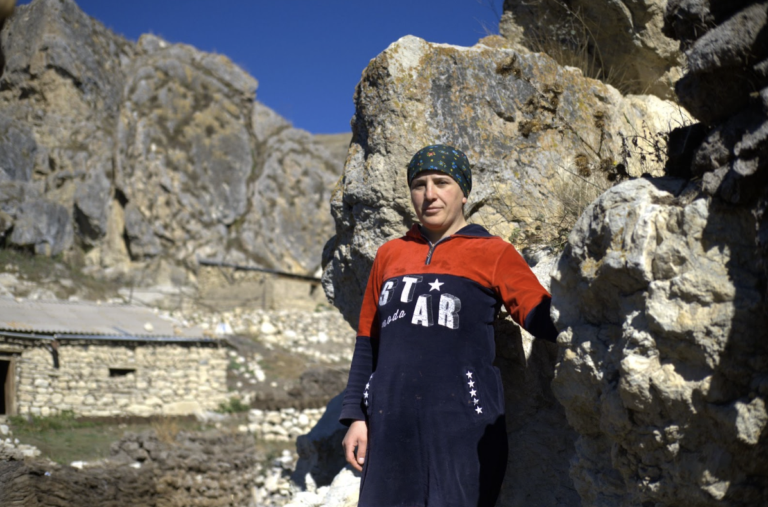Climate change, the environment, and mental health
The triple planetary crisis of climate change, pollution, and biodiversity is impacting mental health now. We are advocating for mental health to be integrated across actions to respond to climate and environmental threats.

Narmin, a local farmer living in a village in the mountains of northern Azerbaijan. Her livelihood and wellbeing have been increasingly impacted by droughts and floods in the region. Photo credit: Elshan Baba
What’s our challenge?
The triple planetary crisis of climate change, pollution, and biodiversity loss is negatively impacting mental health by increasing the risk of new mental health challenges, worsening pre-existing mental health problems, and making people with mental health problems more vulnerable.
It is estimated that, by 2030, the cost of mental disorders caused by climate-related hazards, air pollution, and a lack of access to green space will reach almost $47 billion per year.
How are we tackling it?
We are advocating for mental health to be an integral part of actions to address climate and environmental threats to protect the mental health of people and communities, especially those already at risk or more vulnerable.
We are calling for:
(i) increased data, evidence, and awareness of the impacts of climate change and environmental degradation on mental health
(ii) governments and other relevant organisations and decision makers to include mental health as an integral part of actions to address climate and environmental threats (from adaptation and mitigation to loss and damage policies)
(iii) mental health to be included in climate and environment financing plans
(iv) mental health to receive increased attention at key climate and environment moments in a way that reflects the realities and priorities of communities most affected and people with lived experience and in a way that achieves real and tangible change
Across these areas of work, we are also supporting capacity strengthening efforts among our national partners who are working at the intersection of climate change, the environment, and mental health.
What have we already done?
Working together with our partners, we have:
- Contributed to the inclusion of mental health for the first time ever in multiple multilateral agreement such as the COP28 UAE Declaration on Climate and Health (signed by more than 150 countries), the WHA77 Resolution on Climate Change and Health and the Global Plan of Action on Biodiversity and Health (the first ever multilateral agreement on biodiversity and health)
- Briefed key high-level policy makers on the intersection of climate change and mental health, from the Minister of State for Environment of Nigeria to the Hungarian EU-presidency
- Influenced policy-making processes, including, contributing to the inclusion of mental health within the formal agenda of the expert dialogue on children and health during the UN Climate Meetings in Bonn (SB60)
- Raised the profile of mental health at key global moments such as COPs, by hosting side-events and producing materials such as case studies and media interviews, as well as by supporting national civil society efforts via short-term action groups for COP29 and COP30 through the Global Mental Health Action Network
Find out more…
- Mental Health in Nationally Determined Contributions: Current State and Opportunities for Integration | UGMH’s Report
- Global Mental Health Action Network Advocacy Briefs: Climate Change, Environment, Mental Health and Wellbeing – Impacts and Practical Solutions (available in English, Spanish, French, Portuguese, Azerbaijani, and Mandarin)
- From Baku to Belém: Mental Health at COP29 and Onwards | UGMH’s blog
- Mental Health at COP28: What’s Next? | UGMH’s blog
- The Need and Opportunities for Mental Health Integration into Global Climate Negotiations | Nature Mental Health
- Why Mental Health Should Be Embedded Across Climate and Health Discussions at COP29 | Lancet Psychiatry
Get involved…
Join the Environment Working Group of the Global Mental Health Action Network here to connect with advocates, researchers, and policymakers interested in climate change and mental health across the world.
Join the Hub of Connecting Climate Minds here to connect with researchers working at the intersection of climate change and mental health.